
About us
Manuel Franco Royo School – Who we are We are a school for Early Childhood and Primary Education. The teaching and non-teaching staff of the “Manuel Franco Royo” Public School welcomes all who visit this page.
We hope that you will find all the necessary information, participate with us in our activities and provide your suggestions by mail.
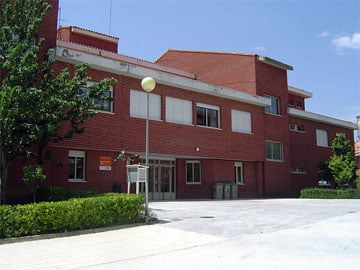
Our Center is a Public School, which means that it is for everyone and that education is free. It is participatory, democratic, adapted to our environment, respectful of differences, whatever they may be… We are an inclusive, socially inclusive school. It is a preferential integration center for students with motor disabilities.
We have special interest in oral and written expression. We make books and stories created by students.
We develop an active and participatory pedagogy to achieve optimal performance in learning, with support for those who need it.
We are a center deserving of the ENVIRONMENTAL QUALITY certification. We take care of an orchard and the playground is a huge garden. We save water and energy. We recycle.
We work on creativity and artistic expression: we make theater and choir groups.
Where we are
The Villa de Andorra, located between the Ebro Valley and the Iberian System, in Lower Aragon of Teruel, at an altitude of 714 meters and with an area of 142 km², is the third population center of the province with 8,300 inhabitants.
The agricultural sector constituted the economic base, with the cultivation of cereals and olive trees, complemented by sheep and pigs. Since the 1950s, the leading role has been occupied by the industrial sector totally linked to mining-energy activity.
At present, underground coal mines have given way to large open-pit operations, whose lignites feed the Thermal Power Plant for electricity production. All this with great concern for the natural environment, restoring mining land for agricultural use and applying the latest technologies to avoid air pollution.
A special economic support plan for the implementation of new industries and the promotion of the tourism sector in Andorra, as the geographical center of a large territory, dotted with interesting landscapes and places of cultural attraction, are the factors for which development is committed of this region in the coming years.
The “Manuel Franco Royo” Public School is the second center for Infant and Primary Education in Andorra. The building is of relatively recent construction, and is located in an area of the town that hardly offers services, being able to consider the neighborhood “bedroom”.
On the outskirts of Andorra, in the so-called “Escatrón neighborhood” and close to the Health Center is our school.
The school compound consists of three buildings: the infant and primary school, the sports center and the caretaker’s house. Our playground is large, with many trees and plants, children’s play areas and a maze.
Our address is:
Escatron Avenue, s/n
44500 Andorra (Teruel)
Telephone: 978 84 35 15
Fax: 978 88 02 06
cpmfrandorra@educa.aragon.es
https://www.colegiomanuelfrancoroyo.com
Facilities
- Building to house the Infant and Primary classrooms. Adequate to be able to serve students with physical disabilities. Elevator.
- Psychomotor room.
- Classroom of Therapeutic Pedagogy.
- Logopedia classroom.
- Computer room.
- Assembly hall with cannon and projector.
- Laboratory.
- Library.
- Audiovisual media and Internet access points in all classrooms.
- Dining room.
- Sports pavilion in an annex building with track and climbing wall.
- Large playground with two sports courts, porch, children’s play area with rubber paving and outdoor games, area with trees.
- Scholar Orchard.
- Janitor’s house.
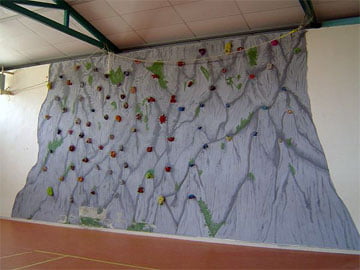
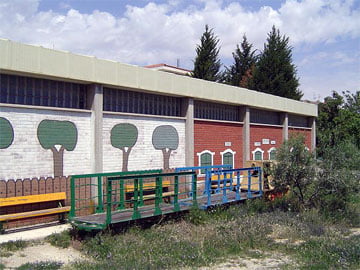
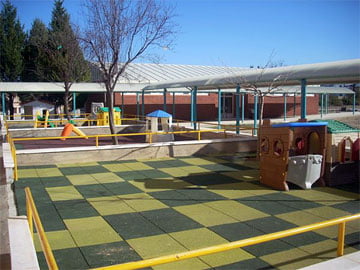
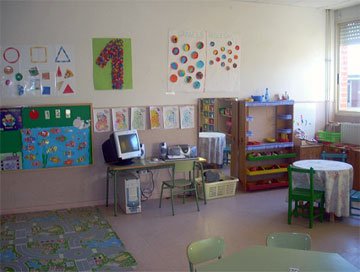
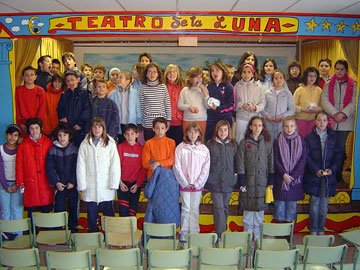
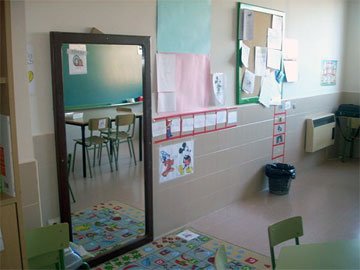
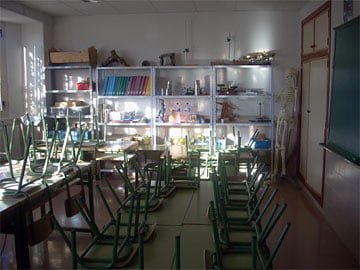
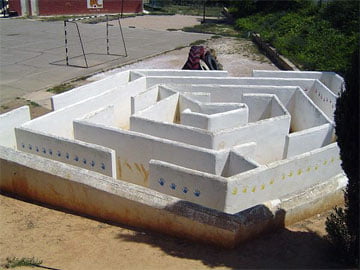
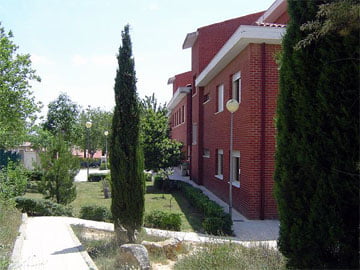
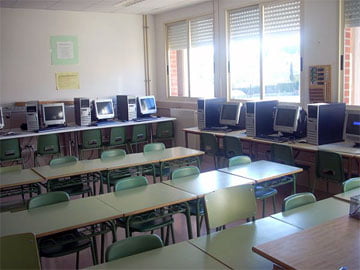
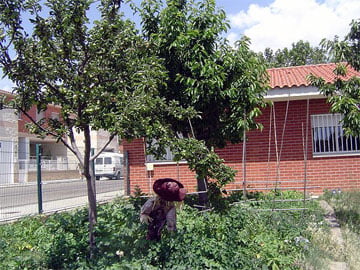
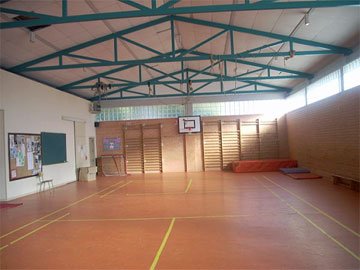
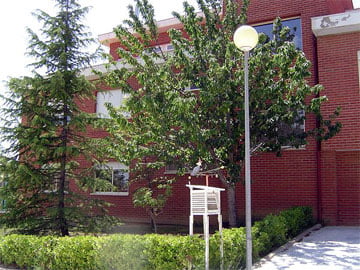
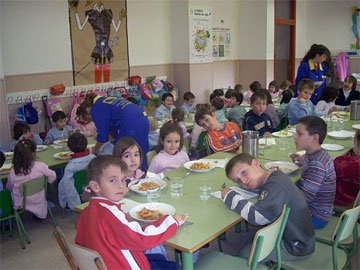

History
Don Manuel Franco RoyoAt the end of the 1950s, a Secondary Education academy began to operate in Andorra, the “Santo Tomás de Aquino” School, dependent on the Delegation of the Teruel Youth Front, which was the one who appointed the Director, although immediately it began to be directed by local teachers: Manuel Aguado Lorente, Lorenzo Durán Bernal and Manuel Franco Royo, successively.
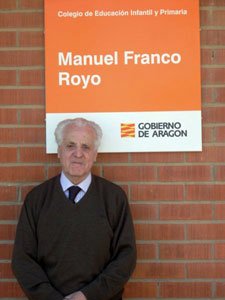
In the 1960s, in the “Poblado” neighborhood of Andorra there was a National School for girls with four teachers and a National School for boys with five teachers. The “La Milagrosa” school for girls with five school units run by the Sisters of Charity. On the other hand, the “Nuestra Sra. Del Pilar” school for children, with three units run by the Salesian Fathers.
With this structure, none of them met the requirement of a complete center, so it was agreed to establish a single school for the entire “Town” with a pluralistic teaching staff: religious and secular, teachers, state and company teachers, and students in coeducation. .
In the 72/73 academic year, with 609 students and 15 teachers (5 nuns, 5 teachers and 5 teachers) the non-state school of E.G.B. “Calvo Sotelo” that would soon be called “ENDESA”.
Coeducation begins with the youngest, with five mixed classes; five classes for boys and five classes for girls, progressively extending to all students.
All the students of Basic General Education went to the schools on Calle Escucha, remaining provisionally, during this course 72/73, the primary students still in classrooms on Calle Belmonte, being in the course 73/74 when all the students from the “Poblado” it passes to the schools on Calle Escucha, definitively abandoning the provisional classrooms of the houses on Ariño and Belmonte streets (occupied for two decades).
In the years 75/76 to 78/79 at the “ENDESA” School, reforms and adaptations had to be made to accommodate the students who were enrolled in the Polyvalent Unified Baccalaureate in the extension of the “Cardenal Ram” National Baccalaureate Institute of Alcañiz, as well as to 113 students of E.G.B. which, with the arrival of the personnel of the “Teruel” Thermal Company, joined the 78/79 academic year.
The non-state college of E.G.B. “ENDESA”, which was born with the General Education Law, was abolished with the implementation of the E.S.O., when the General Organic Law of the Educational System (LOGSE) came into force. All students and state teachers (private teachers were relocated to other positions by ENDESA) became part of the “NUEVA CREACIÓN” Public School, which would later receive the name “MANUEL FRANCO ROYO”. The school was inaugurated in September 1995.
Regulation
The School Board of the school approved its Center Educational Project, which includes the Internal Regulations during the 2008-2009 academic year.
The P.E.C. (Centre Educational Project) is a public document that contains the rights and duties of all members of the educational community.
Extract from our R.R.I.:
Faculty
- The center will be an educational unit for the teachers, so their teaching action will tend to carry out joint activities.
- It will pay special attention to the prevention and resolution of conflicts.
- He will accompany his group of students at all times and on all trips inside the building.
- According to the calendar established in the center, he will take part in the supervision of recesses.
- They will carry out class changes punctually to prevent students from being left without due supervision and care.
- He will leave the students’ work organized when their absence can be foreseen prior to the absence. The teaching staff that replaces him will assume the functions of surveillance, custody and teaching with the group of students entrusted and will seek a systematic advancement of contents.
- Collaborate in maintaining order in the school by complying with and enforcing the established rules.
- It will carry out a continuous evaluation, informing the families of the school development of the students.
- The tutor will hold three joint meetings with all the parents of students in his group and as many individual ones as necessary throughout the course.
- She will establish a visiting hour of one hour per week that will be known to all parents.
Student body
- It is their duty to respect all members of the educational community and all the people who work in the school.
- They will maintain attitudes of respect, tolerance and coexistence towards their peers.
- They will attend class on time.
- They will facilitate their own learning and that of others in the classroom.
- They will follow the guidance of the teaching staff in all educational activities.
- They will respect and take care of the facilities and materials of the center as well as those of the rest of the members of the educational community.
- They will maintain personal hygiene habits.
- The students will keep due order, behaving politely and respecting the rules in complementary and extracurricular activities.
- They will elect their representatives in the School Council in 6th grade.
Parents
- Through their representatives on the School Council, they will collaborate with the center within the scope of their powers.
- Periodically, they will receive information about their child’s academic and attitudinal performance.
- They will collaborate in the care of the building and its facilities, especially the playground at the school exits.
- They will send their children to school in ideal conditions of hygiene, health and food and clothing, respecting punctuality in the time of arrival and departure.
- They will ensure that their children go to school without objects that could interrupt the normal development of the classes.
- Students may leave the center during school hours only in the company of a responsible adult, ensuring that departures are not frequent and are carried out in the shortest possible time.
- When they have to pick up their child during school hours, they will communicate it to the Concierge or Secretary and they will be in charge of going to look for it.
- They will refrain from entering the school building during the entrances and exits of the students except in case of need and provided that the lines are not hindered. These times will not be used to talk with teachers.
- They will accept the school’s recommendation not to send their children to class when they have an infectious disease. They must also notify their child’s tutor in writing of any illness or major organic deficiency in terms of health in order to anticipate and avoid, as far as possible, those activities that pose a risk to the student.
- They must justify in writing or orally the lack of attendance of their children to class.
- They will go to school appointments. When they cannot attend the meetings and interviews, they must arrange another day and time within the time availability of the teaching staff.
- They will provide their children with the necessary material and resources for their studies as well as everything requested by the corresponding teachers.
- They will be informed of their children’s school performance through contact with their teachers and the quarterly newsletter, which must be returned signed.